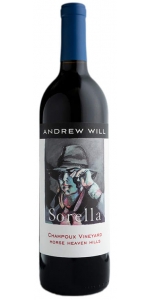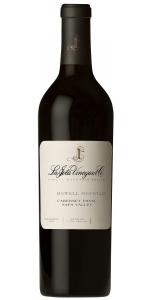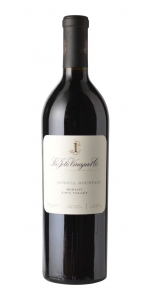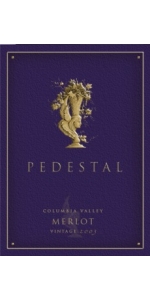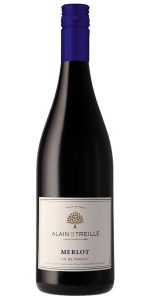La Motte Merlot 2019
6 bottles with free shipping for: $120.00
12 bottles with free shipping for: $216.00
| BUY MORE! SAVE MORE! | ||||||||||||||||||||
|
| Country: | South Africa |
| Region: | Franschhoek |
| Winery: | La Motte |
| Grape Type: | Merlot |
| Vintage: | 2019 |
| Bottle Size: | 750 ml |
La Motte Merlot is made from 100 percent Merlot.
La Motte Merlot offers a bouquet of red currants, cherries and spicy oakiness. It is an elegant, well-balanced and juicy wine with an underlying, refreshing quality.
Excellent with lamb, roasts or casseroles.
Review:
"Medium garnet color. Aromas and flavors of smoked meat, toast, leather, grilled plum, baked cherry tart, cracked black pepper, and myrrh with a round, lively, dry medium body and a smooth, interesting, medium-long finish with notes of chocolate-covered pecans with well-integrated, fine, firm tannins and light oak flavor. A savory and juicy Merlot with a strong sense of place; try with most meat dishes."
- Beverage Testing Institute (April 2021), 90 pts
The La Motte Estate
Situated in the beautiful Franschhoek Valley in South Africa’s Cape winelands, La Motte is home to some of South Africa’s finest wines, recognized internationally for their exceptional quality. In harmony with the production of wines, La Motte has also ventured into flower cultivation and the production of ethereal oils. True to its philosophy of a culture of excellence, La Motte maintains a programme of consistent quality improvement, reaching beyond wine production. The estate has a strong commitment to historic and cultural preservation, as well as the active socio-economic upliftment of its workers and their families. With its picturesque setting, historic buildings and rural atmosphere, La Motte is an enchanting destination for visitors to the winelands of the Cape.
La Motte is synonymous with the highest quality in wines. To carry the La Motte label, each wine has to reflect the greatest expertise in viticulture, combined with experience, passion and a creative flair in wine-making.
Annually a total of 1 000 tons of grapes are processed in La Motte's modern cellars, where old-world wine-making methods are combined with state-of-the-art technology.
History:
In 1695 a piece of land in the Franschhoek Valley was granted to German immigrant Hans Hattingh. In 1709 French Huguenot Pierre Joubert purchased the land and named it after the village of his birth in Provence, La Motte d’Aigues. With the planting of 4 000 vines in 1752, viticulture was established on La Motte by Huguenot descendant Gabriel du Toit. The farm passed through several owners before being acquired by the Rupert family in 1970.
Today, La Motte owner Hanneli Rupert-Koegelenberg and her husband Hein Koegelenberg, CEO of La Motte, oversee La Motte’s making of exceptional wines as well as diversifying La Motte's operations into flower and ethereal oil farming.
The La Motte Vineyards
The unique charm of La Motte’s wines can be attributed to particular soil types, a moderate climate as well as a team of dedicated experts who keep abreast of international viticultural and vinicultural practices.
Viticulturist Pietie le Roux, who majored in viticulture, viniculture and pomology at South Africa’s leading agricultural training institution, has been in charge of La Motte’s vineyards since 1986, assisted by a highly motivated workforce.
“Fine grapes make fine wines”, says Pietie, “therefore we constantly try to improve our harvest results and apply findings obtained from ongoing research and developments in viticulture”.
The most modern practices are employed in the selection of vineyard sites, rootstock and clones, grape varieties planted, vineyard facings and vine spacing. Through extra high trellis poles, a bigger canopy of leaves is created, allowing more leaves to absorb the sunshine, enhancing early ripening and the formation of prominent aromas. The bigger canopy also protects the grapes against direct sunshine. Vine growth is restricted, to limit grape size and promote a high-quality extract, ideal for the production of elegant, complex wines.
These practices are further refined by the precision of science. The latest technology is applied, including GIS (Geographical Information Systems), by which the farm is scanned by satellite, monitoring and controlling the effects of slopes, radiation, micro and macro climates and soil classification.
Through infrared scanning, vine conditions such as stress and irrigation demands can be pinpointed by vineyard block in order to be addressed accurately. In specified vineyards on the La Motte Nabot farm in the Walker Bay region – from where grapes for La Motte wines are obtained – SGS-certified organic farming is practised, totally eliminating the use of chemicals and insecticides, thus promoting health benefits.
Furthermore, La Motte is equipped with a weather station and temperature monitoring system – loggers in vineyards determine humidity, moist conditions and temperatures in zones where grape bunches are formed.
Conscious of the effects of agriculture on the natural habitat, La Motte is accredited to the Biodiversity & Wine Initiative (BWI), a partnership between the South African wine industry and the conservation sector. The objective is to help keep biodiversity intact so that species and ecosystems are able to adapt to changes in the environment and to recover more readily from disturbances in their natural growth system.
Grapes are sourced from the Elgin (34%), Franschhoek (20%), Walker Bay (20%), Nieuwoudtville (9%), Darling and West Coast (8%), Durbanville (5%) and Elim (4%).
Grapes from Franschhoek and Walker Bay are organically grown.
Andrew Will Winery Sorella 2019 is made from 80% Cabernet Sauvignon, 8% Merlot, 8% Cabernet Franc, 4% Petite Verdot.
Sorella means sister in Italian and was named after Chris Camarda late sister Jane Camarda. This first vintage was from 1994. This wine is made from 100% Champoux Vineyard fruit and represents the nature of the vineyard by highlighting the Cabernet Sauvignon, which is considered some of the best in Washington State. The picture on the label is a portrait of Annie Camarda (Chris’s late wife).
Review:
Flirting with triple digits, and perhaps the best Sorella yet, the 2019 Sorella explodes from the glass with a fantastic mineral essence that sways between dark red fruit tones, oak essence and freshly opened flowers. Medium to full-bodied, the wine is impeccably balanced with a silky-smooth mid-palate that bestows a stunningly beautiful wine with gobs of complexity and a ripe frame of glossy black raspberry and blackberry fruit tones. Unwinding across the finish, the wine unpacks gorgeous layers that seduce me for a second, third and fourth sip and finally begs me to finish the glass. Buy this ASAP!
-Wine Advocate 99 Points
La Jota Howell Mountain Cabernet Franc is made from 100% Cabernet Franc.
The 2019 Cabernet Franc opens with aromas of cassis and graphite when poured in the glass. The firm tannins set the stage on the palate melded with rich flavors of boysenberry and pain de grille with a silky mouthfeel and lingering finish.
Review:
Savory in black pepper, smoked meat and cigar box, this wine is high-toned aromatically, with lovely hints of violet and dried herb, sage and bay leaf. Mountain-sturdy tannins give it structure, power and room to age, with lasting acidity to keep it fresh. Enjoy best from 2029–2039
.-Wine Enthusiast 95 Points
La Jota Vineyard Merlot Howell Mountain is made from 100 percent Merlot.
Sourced from vineyards with pedigrees dating back to the 1800s, this wine continues to carry the torch of Howell Mountain’s greatness. e aromatics are lifted with plum, huckleberry and minerality leading the way. Bittersweet chocolate and dried herbs add the punctuation to an incredibly long balanced finish.
-Wine Spectator 95 Points
In general, 2018 was a great vintage for this variety, and the deep purple-hued 2018 Merlot is stunning stuff. Lots of cassis, candied violets, scorched earth, and graphite notes give way to a medium to full-bodied, beautifully textured, elegant 2018 with polished tannins, no hard edges, and a great finish. It’s going to evolve for 15 years or more.
- Jeb Dunnuck 95 Points
- James Suckling 95 Points
Long Shadows Pedestal Merlot is made from 82% merlot, 15% cabernet sauvignon and 3% petit verdot.
Michel Rolland, Pomerol vintner and consultant to many of the world's top wineries, teamed with Washington State wine visionary Allen Shoup to produce this limited release wine.
With its intense color and inviting aromas of dark berries, licorice, baking spice and a hint of smoke, the Pedestal is a bold wine that leaves a lasting impression. Dark fruit flavors integrated with sweetness from the barrel and richness from the tannins come together seamlessly, lingering across a structured mid-palate and lengthy finish.
Winemaking: Hand-harvested grapes were double-sorted to remove green material that might impart harsh tannins, then most of the lots were cold soaked to build richness and flavor before undergoing whole-berry fermentation in 55L upright French wood tanks. This, combined with gentle pump-overs throughout fermentation, enhanced the wine’s color, texture and mouthfeel. The finished wine was aged 22 months in 85% new French oak barrels.
Review:
"The 2019 Pedestal Merlot was made with 21% Cabernet Sauvignon and 4% Malbec. The nose opens with a firm backbone of fresh and ripe black plums and dark cherries before delightful oaky essences sway from the glass with notions of baked earth. Full-bodied, the palate offers a firm mouthfeel that lifts with time to reveal a succulent tannic edge and juicy flavors of spiced plums and blackberry skin with brown baking spices, vanilla and nutmeg that resonate with vibrancy and power. The wine continues to evolve and reveal elegant complexities before ending with a long spicy finish with delightful oak tones. Just under 32,000 bottles were filled after the wine rested for 22 months in all French oak, 86% new barrels. - Anthony MUELLER"
- Wine Advocate (May 11th 2023), 94 pts
All older vintage wines have been purchased from a single collectors cellar. Pictures can be requested before shipment.
Alain de la Treille Merlot is made from 100 percent Merlot.
This Merlot has a deep red color. On the nose aromas of red fruits with a herbal note and spicy scents.
- back
59% Pinot Noir, 41% Chardonnay
An extremely fine and grouped effervescence. The dress is crystalline, luminous, and slightly golden. The nose is fruity, fresh, and tangy. Both greedy and elegant, it expresses pastry notes and aromas of fresh fruit: nougat, frangipane, candied orange, and mirabelle plum. A delicate note of passe-crassane pear carrying a touch of Williams pear liqueur can be guessed. A tonic wine, with a nice tension around the aromas of fresh fruits. Nectarine, yellow peach, and a tangy note of rhubarb develop in the mouth. The end of the mouth is clean, frank, saline, and mineral leaving a touch of bitterness and verbena.
Review:
Having retained all its youthful acidity because there was no malolactic fermentation, the Champagne is brilliantly lit. Acidity and a light texture from the Pinot Noir in the blend give the wine a crisp edge with still-young citrus.
-Wine Enthusiast 94 Points
A firm, focused version, this swathes a chiseled spine of acidity in a raw, silky texture and finely meshed flavors of yellow peach, orange liqueur, honeycomb and chopped almond. A rich streak of salinity drives the well-cut, spiced finish. Drink now through 2035.
-Wine Spectator 94 Points
This unoaked style of Viognier offers an accessible wine with enough body but without wood flavors.
The color is a brilliant green-gold and the style is dry but fruity. The perfume of a floral bouquet greets the nose and follows through with lovely tropical flavors in a light but lingering palate.
Free run juice was used. After settling and acid adjustment, it was inoculated with selected yeast. Fermentation temperature stayed between 13-14 degree Celsius. Wine was left on lees for few months prior to bottling to enhance the flavor. Alcohol: 13.82% Residual Sugar: 3.4 Total Acidity: 5.3 pH: 3.5
Slightly chilled. Lovely with most entrees - from crisp salads to creamy soups. Beautiful with chicken and fish - whether served grilled or in a creamy sauce.


